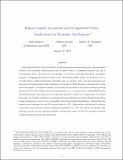| dc.contributor.author | Mestieri, Martí | |
| dc.contributor.author | Schauer, Johanna | |
| dc.contributor.author | Townsend, Robert M | |
| dc.date.accessioned | 2021-10-27T20:05:25Z | |
| dc.date.available | 2021-10-27T20:05:25Z | |
| dc.date.issued | 2017 | |
| dc.identifier.uri | https://hdl.handle.net/1721.1/134526 | |
| dc.description.abstract | © 2017 Elsevier Inc. Using household-level data from Mexico we document patterns among schooling, entrepreneurial decisions and household characteristics such as assets, talent of household members and age of the household head. Motivated by our findings, we develop a heterogeneous-agent, incomplete-markets, overlapping-generations dynasty model. Households jointly decide over their life cycle on (i) kids' human capital investments (schooling) and (ii) parents' entry, exit and investment into alternative entrepreneurial modes (subsistence and modern). With financial constraints all of these are co-determined. A calibrated version of our model can account for the broad correlation patterns uncovered in the data within and across generations, e.g., a non-monotonic relationship between educational choices and assets across occupations, growth in profits and employment for modern firms only, and dynastic persistence across generations in education and wealth. Endogenous human capital acquisition is a key driver of inequality and intergenerational persistence. Eliminating this channel would decrease the top 10% income share by 47%. Eliminating within-period borrowing constraints would increase average household expenditure by 7.1% and benefit the middle class, reducing top and bottom expenditure shares. It would also reduce by 28% the correlation between household assets and kids' schooling levels. | |
| dc.language.iso | en | |
| dc.publisher | Elsevier BV | |
| dc.relation.isversionof | 10.1016/J.RED.2017.02.001 | |
| dc.rights | Creative Commons Attribution-NonCommercial-NoDerivs License | |
| dc.rights.uri | http://creativecommons.org/licenses/by-nc-nd/4.0/ | |
| dc.source | MIT web domain | |
| dc.title | Human capital acquisition and occupational choice: Implications for economic development | |
| dc.type | Article | |
| dc.contributor.department | Massachusetts Institute of Technology. Department of Economics | |
| dc.relation.journal | Review of Economic Dynamics | |
| dc.eprint.version | Author's final manuscript | |
| dc.type.uri | http://purl.org/eprint/type/JournalArticle | |
| eprint.status | http://purl.org/eprint/status/PeerReviewed | |
| dc.date.updated | 2019-09-18T14:26:06Z | |
| dspace.orderedauthors | Mestieri, M; Schauer, J; Townsend, RM | |
| dspace.date.submission | 2019-09-18T14:26:08Z | |
| mit.journal.volume | 25 | |
| mit.metadata.status | Authority Work and Publication Information Needed | |
